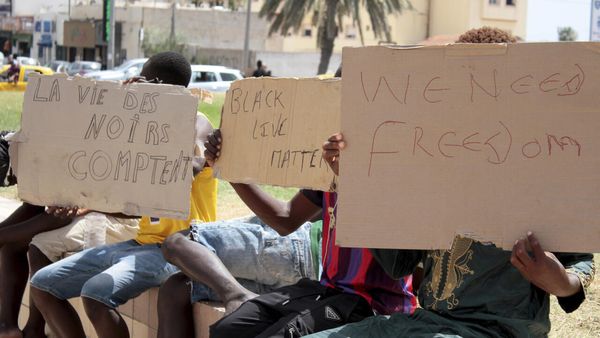
NEW DELHI—India’s Supreme Court ruled that gay sex isn’t a crime, providing a victory for millions who have long been exposed to harassment and discrimination in the socially conservative South Asian nation because of a colonial-era law.
A nearly 500-page document outlining the court’s decision on Thursday declared that parts of a penal code called Section 377 banning sex acts labeled “against the order of nature” were unconstitutional.
While few members of the lesbian, gay, bisexual and transgender community were actually prosecuted for the crime, the law was used to blackmail, harass, silence and shame.
“The first step on the long path to acceptance of the diversity and variegated hues that nature has created has to be taken now by vanquishing the enemies of prejudice and injustice and undoing the wrongs done,” Chief Justice Dipak Misra said as he read out the beginning of the statement.
India has taken a turn toward more conservative values as voters have backed the ruling Bharatiya Janata Party, which has Hindu-nationalist roots. Still, the party’s leadership hasn’t taken a unified stand on Section 377. One of the strongest indications that it might be struck down came this year when the BJP-led federal government said it wouldn’t challenge any court decision on the issue.
It was a long road to the landmark decision. A lower court concluded that Section 377 was unconstitutional in 2009 only to be overturned in a Supreme Court judgement in 2013 that said it wasn’t the job of the courts to make a call on whether or how to change the code. The court said it was up to legislators to change the law. Rights groups and individuals petitioned the court to reconsider and after hearings this year, the five-judge bench on Thursday unanimously ruled Section 377 unconstitutional to the extent it criminalizes consensual sexual acts between adults in private. The court left a ban on bestiality in place.
After the decision, Indian television broadcast images of people dancing, eating cake and crying. Gay-rights leaders gave speeches and other people said it was a crucial step toward being accepted in Indian society.
“It’s a very important and historic judgment,” said Arundhati Katju, a lawyer representing some of the main petitioners. “Hats off to all the people from the LGBT community who fought hard for it.”
The law had found the most support from conservative religious leaders, most of them arguing in courts that homosexuality is a sin.
“We are sad” after the court’s decision, said Sam T. Varghese, general overseer of Apostolic Churches Alliance, a body of independent churches in the southern Indian state of Kerala and other parts of India that had opposed homosexuality at the Supreme Court.
“According to the Bible, we call [homosexuality] a sin,” Mr. Varghese said. “But we are only hating the sin, not those committing it who are equally loved by God.”
Despite those arguments, some of which were presented in court, Thursday’s judgment said Section 377 impinged on people’s rights.
“Social exclusion, identity seclusion and isolation from the social mainstream are still the stark realities faced by individuals today and it is only when each and every individual is liberated from the shackles of such bondage and is able to work towards full development of his/her personality that we can call ourselves a truly free society,” the judges said.
Some of the groups behind the successful bid to decriminalize gay sex say they plan to turn their attention to making same-sex marriage legal.
“The way the judgement has been worded, I think it paves the way for us to actually move forward. Perhaps in the months and years to come we could file fresh pleas for the other rights that we could be asking for,” said Balachandran Ramiah, 55 years old, one of the petitioners on the case and part of a group called Gay Bombay.
For now, many are satisfied with Thursday’s decision.
Around 100 people gathered along the Arabian Sea in Mumbai’s trendy Bandra district to chant “freedom,” sing, hand out sweets and hugs.
“The things the judges said were so nice and important and that made the victory so much more beautiful,” said Anisha, a Mumbai resident who was decked out in a rainbow waistcoat while walking her dog, which was wearing a rainbow ribbon.
Until Thursday’s ruling, India—the world’s largest democracy—was among more than 70 countries including Afghanistan, Nigeria, Syria, Sri Lanka and Pakistan where gay sex is illegal, according to the International Lesbian, Gay, Bisexual, Trans and Intersex Association, a Geneva-based rights group.
The countries of Asia are going different directions on gay rights. Some places, including Pakistan, Bangladesh and Indonesia, seem to have an increasing number of groups that want to enforce a strict moral code based on religion.
In Malaysia, Prime Minister Mahathir Mohamad on Thursday said a lesbian couple caned this week by Islamic authorities in the northeastern state of Terengganu should have been let off with a warning.
“It is important that we show Islam is not a cruel religion that favors heavy punishment that humiliates people,” Mr. Mahathir said. His government, however, has limited power over state-level application of Shariah, or Islamic law, for Muslims.
In India, the law banning gay sex was a provision in the Indian penal code that British rulers introduced in 1860. It stated that anyone having “carnal intercourse against the order of nature” shall be punished with imprisonment as well as a fine.
In a plea to the Supreme Court in 2016, five leading petitioners—a journalist, a chef, a dancer, a hotelier and a business consultant—asked the court to declare the law unconstitutional, saying it violated their “rights to sexuality, sexual autonomy, choice of sexual partner, life, privacy, dignity and equality,” along with other fundamental rights that India’s constitution guarantees to all its citizens.
Write to Krishna Pokharel at krishna.pokharel@wsj.com and Corinne Abrams at corinne.abrams@wsj.com







